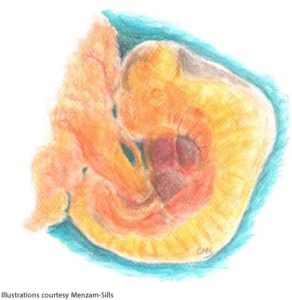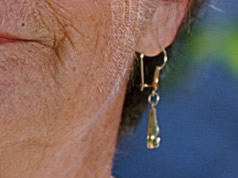(March Issue 2019)
By Cherionna Menzam-Sills, PhD, ISMETA RSMT/E, RCST
Adapted from a chapter in her forthcoming book,
Fluid and Cosmos: Embodying Our Original Embryological Potential
Shadow leaks into our lives, unconsciously affecting our perceptions, thoughts, behaviors, attitudes, relationships, bodies and personalities. Pre- and perinatal experience, rarely acknowledged or reflected during childhood, generally retreats into the unconscious, seldom coming into words and conscious thoughts. It is almost by definition shadow material.
Much of pre- and perinatal therapy orients to early traumas. While important to acknowledge, understand, and liberate from shadow, my mission in this field is to also highlight the amazing potential of little embryos in the womb developing from one tiny cell into complex individuals. How much of that potential to become also hides in shadow? How can we access and embody our original embryological potential? How can we shine the light on both the suffering and the health it may obscure?
Shadow, a term from Carl Jung, refers to unconscious qualities repressed or rejected within ourselves. Shadow aspects develop early in life in response to an inherently ambiguous world (Fairbairn, 1994). Life includes what we perceive as good as well as bad. Little ones need to perceive their relationship with mom as consistently good and safe. Even the best of mothers, however, are human. They are not always happy and do not always perfectly meet the child’s needs and expectations. Pregnant women experience stress, loss, and life, passed on to the prenate biochemically and energetically. The field of mother inevitably includes both nourishing and toxic elements. To tolerate such ambiguity, little ones develop a split self system, some aspects organizing around feelings of goodness and others around feelings of badness.
Shadow generally relates to feelings of badness. Little ones experiencing anger, terror, hatred or disgust toward abusive or toxic parents experience a double bind. Their life depends on mother and her caring acceptance. Rejecting or withdrawing from her means death. Survival requires opening to her, rejecting or withdrawing from unacceptable feelings. Even in the womb, babies may try to stay invisible to avoid being discovered by a rejecting mother. Invisibility and hyper-vigilance can become part of the developing personality.
Rejecting or withdrawing from her means death. Survival requires opening to her, rejecting or withdrawing from unacceptable feelings. Even in the womb, babies may try to stay invisible to avoid being discovered by a rejecting mother. Invisibility and hyper-vigilance can become part of the developing personality.
Already have an account linked to your magazine subscription? Log in now to continue reading this article.
 (Need help? Click here or contact us to ask a question.)
(Need help? Click here or contact us to ask a question.)





